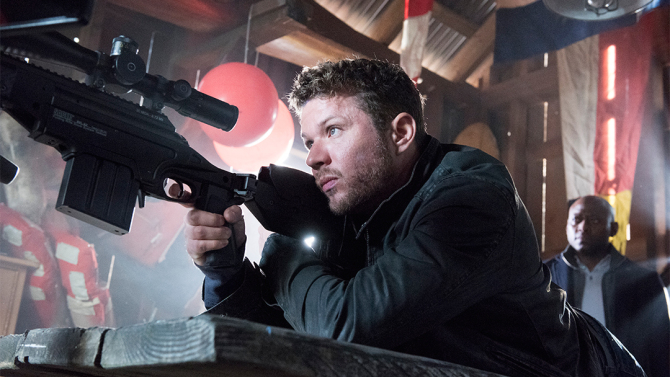The premise of USA’s ten-episode series “Shooter” is certainly loaded: A highly-ranked veteran sniper with one of helluva name, Bob Lee Swagger (Ryan Phillippe playing a part once carried by Mark Wahlberg in the 2007 movie of the same title), is brought out of domestic solitude to help prevent an assassination on the president. He’s a good pick for the job: “Shooter” portrays the veteran as an ultimate real-life action hero, who can recognize a gun model and its bullets as a sixth sense, but lives by the humble values of honor, family and country ingrained during the service. Swagger is the kind of guy who quietly sends flowers every year to the mother of a fellow fallen soldier, in case you weren’t already supposed to like him enough.
But Swagger becomes the target of an international conspiracy, when he’s enlisted by a government official and former friend of his from the military days, Isaac Johnson (Omar Epps), who sets Swagger up when someone else does try to take the shot. Swagger is then pursued by FBI Agent Nadine Memphis (Cynthia Addai-Robinson) while his wife Julie (Shantel VanSanten) and daughter are put into uncertain danger. Meanwhile, Johnson and others (including a CIA agent played by Tom Sizemore) try to keep their evil plan under wraps by any means or murders necessary. In the power plays of “Shooter,” the hunter becomes the hunted, until Swagger goes back to being the hunter, trying to prove his innocence while tracking the real killer.
As tactful as the story can sometimes be with narrative and sniper knowledge, it never feels that original. Based on a 1993 book (Stephen Hunter’s Point of Impact) and the Antoine Fuqua movie made from it in 2007, “Shooter” is like a time capsule inside a time capsule, the “Enemy of the State” actioners of the 90s with the gun-nut glamour of the NRA-rights dominated aughts. In 2016, the story has a heavy “American Sniper” flavor, replete with traveling bullet POV animation, along with fulfilling our apparent modern need to have heroes just as much as conspiracy theories. To give you an idea of whether your own post-election politics will work with this story, the FBI are the good guys and the gun is a vital appendage of power. But when Russia gets involved in later episodes they’re not the heroes, so it’s not entirely up-to-date with Trump politics.
One huge element of “Shooter” is Phillippe. Like he did with his 2014 directorial debut “Catch Hell,” he’s actively, curiously trying to change his image and shed that teen-dream ’90s gloss for some handsome, all-American grit. This back story does lead to some charisma as we follow Swagger, but without him having a great line or even a good punch to give, his efforts here as an actor and producer are betrayed. You end up rooting for Philippe more than Swagger.
“Shooter” is surprising in ways not intended: The brief sequences of action never leave a mark, and the sniper science talk has the same sleight-of-hand as a closing argument on “Franklin & Bash.” The odd nature about “Shooter” is that in spite of all this, it kind of works. There are enough moving pieces, back stabbings and secret meetings that the story always feels to be in motion, with huge stakes that you do want the answers to. And what it lacks in original characters it makes up for with pacing, which is more immediate than most TV shows, of any IQ caliber, that I’ve seen. Consider it the “Shooter” paradox, that this story has considerable energy as a ten-episode series, while telling the same story as a two-hour film, which itself was originally told as a 451-page book. If only it tried to have more grit beyond scowling traitors, goofy dialogue (“You left a lot of crumbs, hell, you left the whole damn cake”) and gun porn. You can see why this project was made for cable network audiences, but you’ll be wishing the execution was more inventive.












